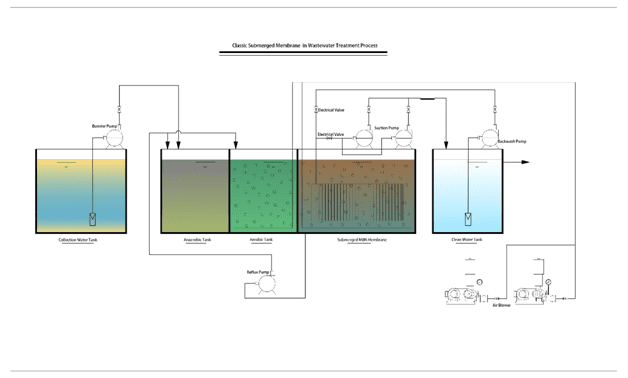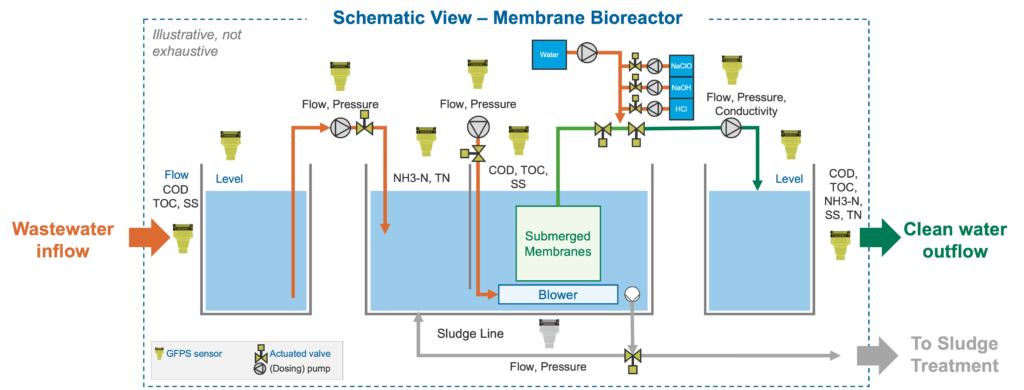How Membrane Bioreactor Can Improve the Quality of Wastewater Treatment
How Membrane Bioreactor Can Improve the Quality of Wastewater Treatment
Blog Article
The Advantages of Membrane Bioreactors in Lasting Wastewater Administration
Membrane bioreactors (MBRs) represent a pivotal innovation in lasting wastewater administration, efficiently combining organic therapy with sophisticated membrane layer purification innovation. As the need for sustainable services intensifies, checking out the complex advantages of MBRs might disclose unforeseen effects for the future of wastewater therapy systems.
Review of Membrane Layer Bioreactors
Membrane layer bioreactors (MBRs) represent a significant advancement in wastewater therapy technology, incorporating biological degradation with membrane filtering to boost the performance of the treatment process. This cutting-edge system incorporates the benefits of standard triggered sludge processes with membrane innovation, allowing for boosted solid-liquid splitting up. MBRs use semi-permeable membrane layers to different cured water from biomass, leading to top notch effluent that can be reused or securely released right into the environment.
The operational design of MBRs usually entails a bioreactor where microorganisms damage down natural issue, complied with by a membrane unit that filters the mixed alcohol. This configuration not only decreases the footprint of the treatment facility but likewise permits greater biomass concentrations and lowered hydraulic retention times. Additionally, MBRs are qualified of dealing with a wider variety of impurities, including microorganisms and nutrients, making them appropriate for numerous applications, from community wastewater therapy to commercial effluent handling.
The combination of MBRs right into wastewater administration systems is a sign of a growing trend in the direction of lasting and reliable practices in ecological design. Their capacity to produce premium effluent while lessening area demands settings MBR innovation as a vital gamer in contemporary wastewater treatment services.
Improved Effluent Quality

The membrane filtration process acts as a physical obstacle, allowing the retention of microorganisms and particle issue, which adds to a clearer and cleaner effluent (Membrane Bioreactor). MBRs run at higher biomass concentrations than standard activated sludge systems, promoting extra efficient biodegradation of toxins. This brings about a decrease in biochemical oxygen demand (BODY) and overall suspended solids (TSS) degrees in the last effluent
Additionally, MBRs show outstanding efficiency in treating tough wastewater structures, such as commercial effluents and wastewater with high nutrient loads. Therefore, the effluent generated is often of better, enabling even more flexible disposal options and lowered environmental influence. Ultimately, the improved effluent high quality achieved with MBR modern technology underscores its important role beforehand sustainable wastewater monitoring practices.
Water Reuse Opportunities
The top notch effluent generated by membrane layer bioreactors (MBRs) opens up considerable possibilities for water reuse in various applications. MBRs efficiently get rid of pollutants, consisting of pathogens, suspended solids, and raw material, leading to cured water that fulfills or exceeds regulative requirements for reuse. This high quality permits for the implementation of water recycling efforts throughout diverse industries.
One famous application remains in farming, where dealt with wastewater can be used for irrigation, promoting sustainable farming techniques while preserving freshwater sources. Furthermore, MBR-treated effluent can be made use of for commercial procedures such as cooling, cleaning, and as a process water source, check this site out substantially lowering the demand for drinkable water in these procedures.
In city settings, MBRs assist in the usage of recovered water for landscape irrigation, bathroom flushing, and other non-potable uses, adding to the general strength of water supply systems. Furthermore, the integration of MBR technology in decentralized systems help in managing localized water demands, specifically in water-scarce areas.
Minimized Ecological Effect
Exactly how can the fostering of membrane layer bioreactors (MBRs) contribute to a reduced ecological influence in wastewater management? MBRs considerably enhance the therapy read this effectiveness of wastewater while reducing ecological disturbances. By incorporating biological therapy procedures with membrane filtering, MBRs successfully remove a vast array of pollutants, consisting of raw material, nutrients, and microorganisms. This innovative purification leads to higher-quality effluent, which is crucial for protecting aquatic ecosystems and minimizing the concern on all-natural water bodies.
Furthermore, MBRs run at reduced hydraulic retention times compared to conventional systems, leading to smaller sized treatment plant footprints. This small design lowers land usage, thereby maintaining all-natural habitats and biodiversity. The process likewise creates much less sludge than conventional techniques, mitigating disposal challenges and reducing greenhouse gas exhausts associated with sludge administration.
In addition, MBRs facilitate the recovery of important sources, such as water and nutrients, adding to a circular economy. By allowing water reuse for watering or commercial procedures, MBRs assist relieve freshwater scarcity, thus advertising sustainable water utilize methods. Eventually, the fostering of MBR modern technology represents a considerable stride towards decreasing the ecological influence of wastewater management systems.
Economic Advantages of MBRs

In addition, MBRs help with the production of premium effluent, which can be reused for numerous applications, such as farming watering and industrial procedures - Membrane Bioreactor. This reuse capability can substantially reduce water procurement costs, providing a financial incentive for industries facing stringent water laws
The portable style of MBR systems likewise leads to decreased land requirements, which is specifically useful in metropolitan locations where realty is costly. By minimizing room, communities and markets can Membrane Bioreactor conserve on land purchase and maintenance expenditures.
Additionally, MBRs typically require much less regular maintenance and have a longer life-span than standard systems, further adding to set you back savings. In recap, the economic benefits of MBRs-- ranging from lowered functional prices to land cost savings and effluent reuse-- make them a compelling option for sustainable wastewater administration, providing both long-term and instant economic advantages.
Conclusion
Membrane bioreactors stand for a transformative strategy to lasting wastewater monitoring, combining biological therapy with advanced membrane purification for exceptional effluent high quality. Their ability for effective pollutant removal promotes water reuse, thus saving essential freshwater resources. Additionally, MBRs add to reduced environmental influences via portable designs and reduced sludge generation. Economic advantages additionally boost their stability, making MBRs an appealing solution for dealing with the difficulties of wastewater therapy and advertising lasting source monitoring.
Membrane bioreactors (MBRs) stand for a critical improvement in lasting wastewater monitoring, properly combining biological treatment with sophisticated membrane layer purification modern technology.Membrane layer bioreactors (MBRs) represent a significant advancement in wastewater therapy modern technology, incorporating biological degradation with membrane layer purification to improve the performance of the therapy procedure.Attaining boosted effluent high quality is one of the most substantial advantages of utilizing membrane layer bioreactors (MBRs) in wastewater treatment.Furthermore, MBRs show superb performance in dealing with difficult wastewater compositions, such as industrial effluents and wastewater with high nutrient loads.Incorporating membrane bioreactors (MBRs) right into wastewater administration not just minimizes environmental impact yet also offers considerable financial advantages.
Report this page